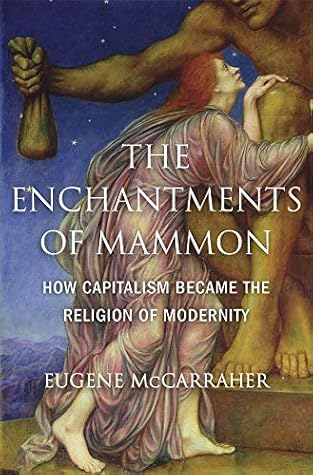More on this book
Kindle Notes & Highlights
Started reading
June 12, 2020
“All that is solid melts into air; all that is holy is profaned.”
capitalism is a religion as well, a “cult” with its own ontology, morals, and ritual practices whose “spirit … speaks from the ornamentation of banknotes.”
even Nietzsche’s Übermensch represented, Eagleton writes, a “counterfeit theology.” In our incorrigibly ironic era of postmodernism, the venerable questions of meaning and destiny are sloughed off as unreal and coercive “metanarrative”; even revolutionary hope—another grasp at transcendence—yields to the conquest of cool, the imperium of a hip plutocracy. “The only aura to linger on,” Eagleton sadly concludes, “is that of the commodity or celebrity.”
Money can buy you love: as the young Marx mused in an early reflection on “the power of money in bourgeois society,” money enables its possessor to say “I am ugly, but I can buy for myself the most beautiful of women. Therefore I am not ugly, for the effect of ugliness—its deterrent power—is nullified by money.”16 Under capitalism, money occupies the ontological throne from which God has been evicted.
The world can never be disenchanted, not because our emotional or political or cultural needs compel us to find enchantments—though they do—but because the world itself, as Hopkins realized, is charged with the grandeur of God.
the earth is a sacramental place, mediating the presence and power of God, revelatory of the superabundant love of divinity. In Christian theology, another way to say that the world is “enchanted” is to say that it is sacramental; in Graham Ward’s words, the material world “bears the watermark of its creator.”
Without faith in the sacramental nature of the world, we anchor ourselves in the illusory and inevitably malevolent apparatus of domination: patriarchal lineages, property lines, police departments, surveillance networks, military-industrial complexes.
the moral and ontological primacy of money in capitalist civilization has valorized a particular conception of “progress” that was, in their view, humanly and ecologically destructive despite all the material benefits it has conferred. (Even Marx succumbed to it.) Yet they did not call for the restoration of earlier social orders, nor did they believe that hammers and hoes would exhaust the technical possibilities of a world after capitalism. Their example suggests not that we should resurrect the past, but that we need to revisit what we mean by “progress,” and not change the subject by
...more
“there is no wealth but life,”
“the earth is a Paradise. We don’t have to make it a Paradise—it is one. We have only to make ourselves fit to inhabit it.”
The grotesque ontology of scarcity and money, the tawdry humanism of acquisitiveness and conflict, the reduction of rationality to the mercenary principles of pecuniary reason—this ensemble of falsehoods that comprise the foundation of economics must be resisted and supplanted. Economics must be challenged, not only as a sanction for injustice but also as a specious portrayal of human beings and a fictional account of their history.
many on the “left” continue to share far too much with their antagonists: an ideology of “progress” defined as unlimited economic growth and technological development,
Romantics redefined rather than rejected “realism” and “progress,” drawing on the premodern customs and traditions of peasants, artisans, and artists: craftsmanship, mutual aid, and a conception of property that harkened back to the medieval practices of “the commons.”
We will not be saved by our money, our weapons, or our technological virtuosity; we might be rescued by the joyful and unprofitable pursuits of love, beauty, and contemplation. No doubt this will all seem foolish to the shamans and magicians of pecuniary enchantment. But there are more things in heaven and earth than are dreamt of on Wall Street or in Silicon Valley.
God protects and mends the despoiled world, watchful, forgiving, and resplendent. “The Holy Ghost over the bent / World broods with warm breast and ah! bright wings.”
Protestant capitalists reworked the sacramental imagination of medieval Catholicism, aligning its conviction of metaphysical enchantment with the imperatives of dispossession, enclosure, and profit.
According to the thirteenth-century prelate and homilist Jacques de Vitry, usurers eat not the Eucharist but rather “the bread of impiety”—usury was, in this view, a desecration of the sacrament.
The popularity of St. Francis of Assisi in the early thirteenth century is incomprehensible outside the idealization of poverty and dispossession.
The typical peasant, Rodney Hilton observes, felt a “permanent rage against nobles whom he blamed, as a whole, for not having fulfilled their duty of protection which tradition and mutual obligation demanded of them.”
Since Protestant theology and enchantment was the reigning religious culture of seventeenth-century England, “improvement” required the sanction and discipline of God. Echoing older Catholic warnings against avarice, Puritan ministers admonished merchants, artisans, “improving” landowners and tenants, and others for whom thrift and diligence were cardinal virtues in the newly competitive society of Stuart England.


